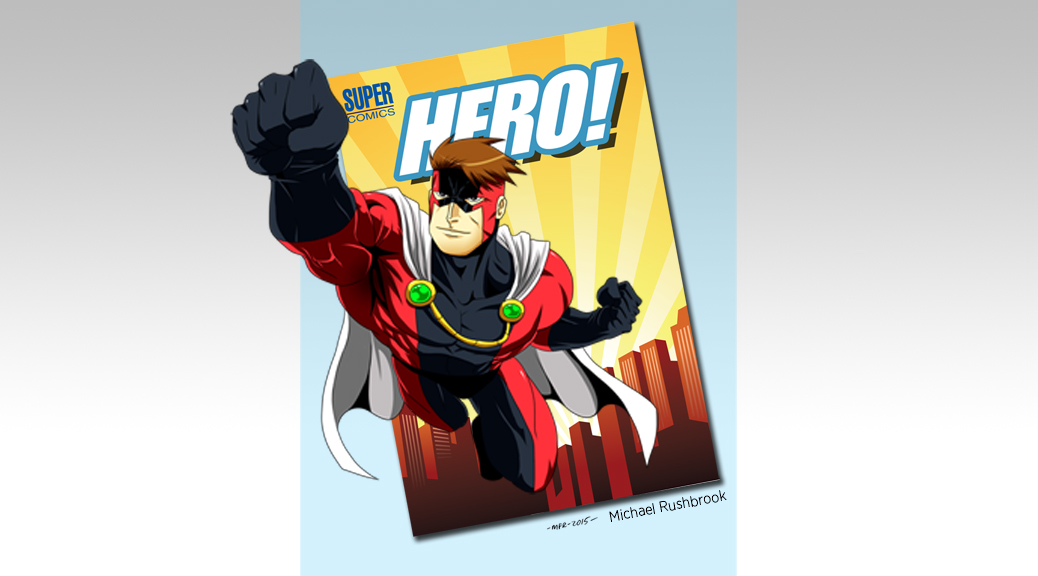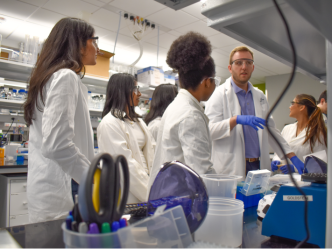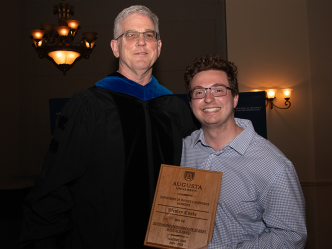As an Honors Criminal Justice and Psychology double-major, one exceptional Georgia Regents University student has dedicated himself to a strain of research that is as intriguing as it is unbelievable.
You see, Austin Hendricks studies the minds of superheroes.
“I’ve always had an interest in the concept of superheroes,” said Hendricks. “While the majority of my interest focuses on specific mediums, I’ve read many of the comics that have been collected into graphic novels.”
For the purpose of this particular study, Austin limited his study to only the movie portrayals of certain famous comic characters. More specifically, he focused on the Christopher Nolan Batman trilogy as well as Marvel’s Iron Man and Avengers films.
And, like many successful research ventures, Hendricks’ ideas began in the classroom.
“The idea originated with a paper I wrote for my Abnormal Psychology class,” he said. “I discussed the portrayal of psychology as a discipline and the portrayal of individuals with psychological disorders in the first Iron Man film.”
Once he’d finished that first paper, Hendricks decided he wanted to explore how psychological disorders were portrayed in other superhero films as well. Topics covered in his research include the reasons why heroes resort to alter-egos and vigilantism to cope with their disorders, and how society’s view of “deviant” behavior is shifting in response to the actions of individuals perceived as heroes.
Though finalizing this kind of research is never an easy task, Hendricks said the hardest part was finishing it in one semester.
“It ended up becoming so big that I had to cut some of my ideas to improve the flow,” he said. “Some of the theories I’m using are complex, and it was difficult to explain them in ways that would make sense to readers.”
It was crucial for Hendricks to finish when he did because in addition to its standing as an exceptional piece of research, Hendricks’ study also serves as his Honors thesis.
What’s unique about said thesis, though, is that he’s researching outside of his major to complete it.
Dr. Jared Hegwood, a professor in the Department of English and Foreign Languages, currently serves as Hendricks’ faculty mentor.
“Austin is the third Honors Prospectus I’ve been lucky to have, and the second that focused on super-hero narratives,” said Hegwood. “The Honors Prospectus candidates work with a small committee made up of a faculty adviser and an in-field reader. Over the course of a year, the candidate produces meaningful research in his or her field, spending the first semester on a prospectus and the following on the thesis itself.”
Normally, students producing exceptional research are encouraged to submit their work at Center for Undergraduate Research (CURS) Research Seminars – a terrific venue for high-caliber student research. But Hegwood said he saw something more in Hendricks’ work.
The Comics and Popular Arts Convention is an annual academic conference held in conjunction with Dragon Con, one of the largest multigenre conventions in North America. Hosted yearly in Atlanta, Dragon Con drew in an attendance of more than 50,000 con-goers in 2012, and boasted dozens of celebrity guests from around the globe.
Hendricks will present his thesis at CPAC over Labor Day weekend. In a way, it’s fitting, especially for someone under Hegwood’s guidance. He, too, presented at CPAC not too long ago and said it was a fun opportunity, though he stresses that the much more formal, much more academic CPAC is a far cry from the rowdy fun of DragonCon.
An old hand at working with Honors Prospectuses, he said the experience of working with Honors students is always rewarding, though, whether it involves conventions or not.
“I really enjoy working with thesis students,” said Hegwood. “They’re passionate about the research and it’s always rewarding to be reminded of what first got you excited about your own work.”
He said Honors students are that much more willing to push, to see what works and what doesn’t in their given fields. That same determination often leads to success, and occasionally, camaraderie.
“For me, it’s like having an intense conversation with someone that loves the work as much as I do, a conversation that lasts a year,” said Hegwood. “That it just happens to produce a body of high quality research is a happy accident of my profession.”
 Augusta University
Augusta University




